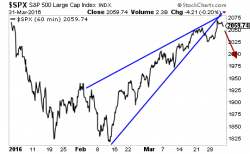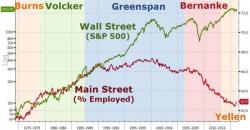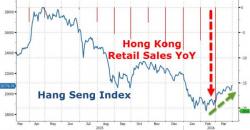When Stocks Adjust to Economic Realities, Many Investors Will Lose Everything

Stocks are rolling over.
As we wrote about earlier this week, the S&P 500 was pushing for a final “kiss” of the broken bearish rising wedge pattern:
The next move should see us drop sharply.
Big picture stocks have effectively gone nowhere since QE 3 ended in November 2014. Yes it’s been a volatile ride, but all things considered stocks have largely traded sideways for 16 months.
Meanwhile, beneath this veneer of stability, the global economy has fallen off a cliff.
Last year (2015) marked the worst year for global trade since the Great Crisis.

